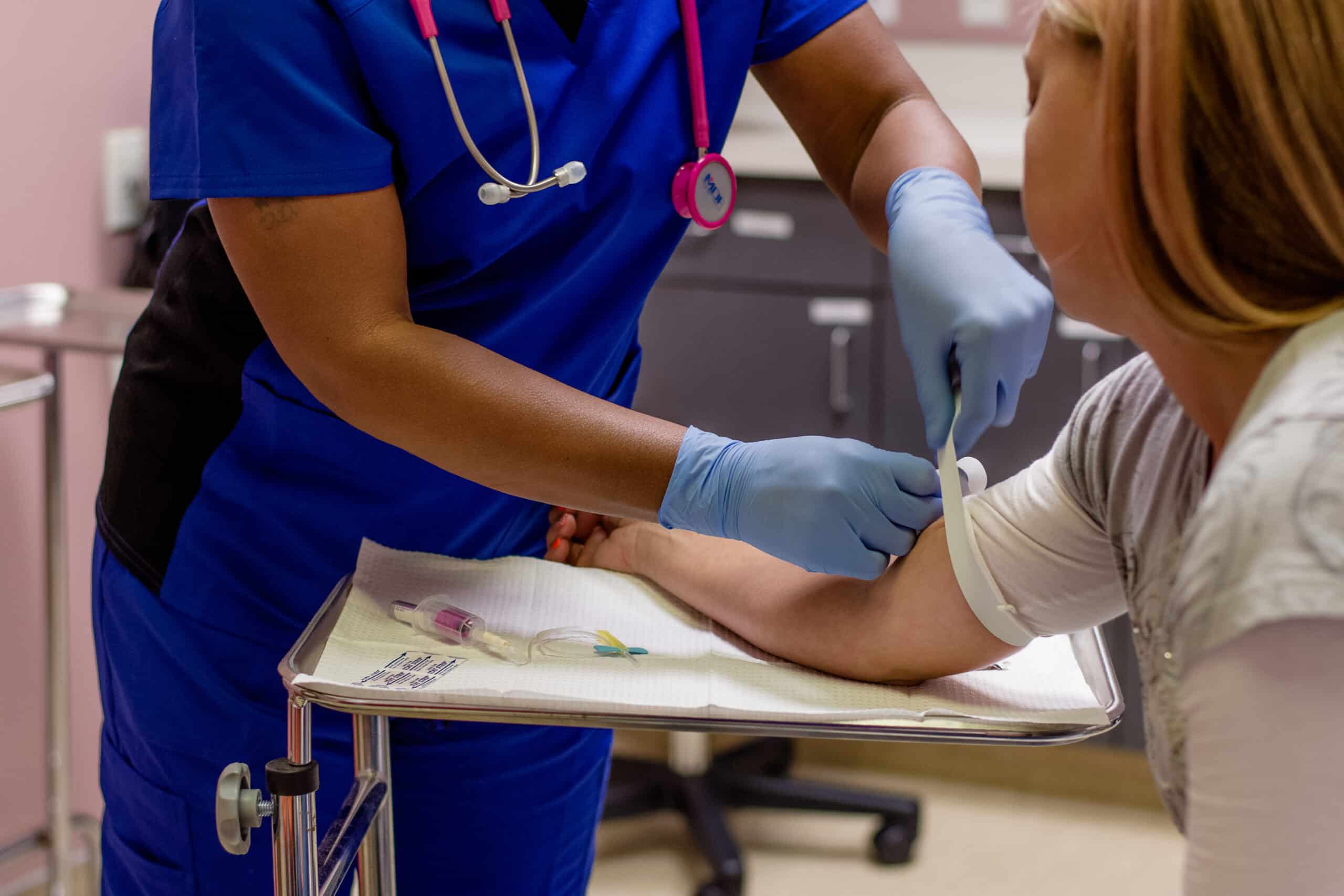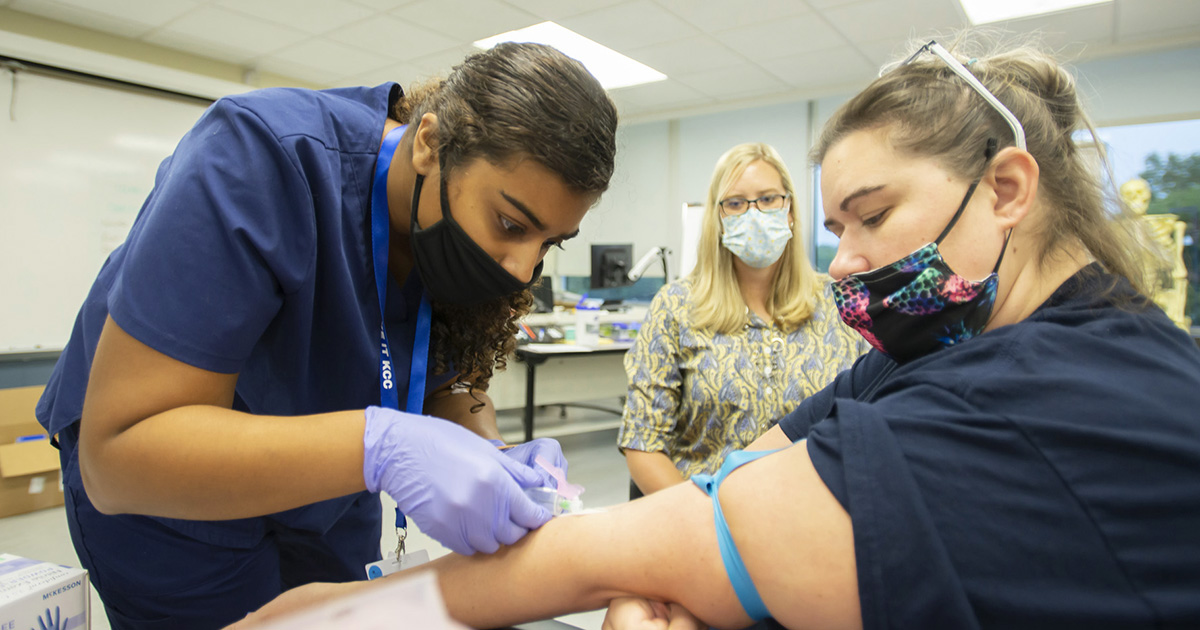Your Step-by-Step Guide to Starting Phlebotomy school With Confidence
Wiki Article
The Path to Accreditation: Recognizing the Phlebotomy Training Program Journey and Its Value
As you think about the course to certification in phlebotomy, it is necessary to recognize the role you'll play in health care. Your training will certainly cover important abilities, from blood collection strategies to patient communication. Each component of the program prepares you for the challenges in advance. What precisely does the trip require, and why is qualification so essential for your future profession? Allow's discover these concerns additionally.
The Role of Phlebotomists in Health Care
Phlebotomists play an important function in the medical care system, working as the crucial link between individuals and crucial analysis screening. You'll perform blood attracts, ensuring examples are accumulated precisely and securely. Your know-how helps in identifying clinical conditions, keeping an eye on health, and directing therapy choices.In your daily communications, you'll require to establish depend on with patients, making them feel comfy during what may be a demanding experience. You are in charge of classifying and handling examples thoroughly to stop contamination or errors, which might influence test results.
Beyond this, you'll commonly function together with physicians and nurses, interacting vital info regarding clients' conditions. By mastering your skills, you add meaningfully to person treatment, making you a vital component of the medical team.
Summary of Phlebotomy Training Programs
When exploring phlebotomy training programs, you'll find various kinds created to fit various routines and discovering styles. Each program helps you create vital skills like blood collection and patient communication. Comprehending these options is key to picking the ideal path for your career.Kinds Of Training Programs
Several types of training programs are readily available for those looking to become proficient in phlebotomy. Furthermore, some hospitals and facilities use on-the-job training programs, offering sensible experience while you learn. Whatever path you select, each program intends to furnish you with the required abilities for an effective phlebotomy occupation.
Trick Skills Established
Grasping phlebotomy needs a set of crucial abilities that are created with comprehensive training programs. In addition, communication abilities are essential; you'll require to engage with patients, describe procedures, and placed them at ease. Each of these abilities is important for your success as a qualified phlebotomist, making you an important property in any type of medical care setting.Secret Components of a Phlebotomy Program
In a phlebotomy training course, you'll focus on essential topics that prepared for your future profession. You'll involve in hands-on training that permits you to apply what you have actually found out in real-world settings. Both the core educational program and practical experience are crucial for your success as a phlebotomist.Core Curriculum Introduction
While pursuing a phlebotomy training course, you'll come across a core educational program designed to furnish you with essential abilities and knowledge. Phlebotomy Training Course. This curriculum commonly consists of anatomy and physiology, concentrating on the circulatory system and recognizing blood components. You'll also discover various kinds of blood collection approaches, consisting of venipuncture and capillary puncture techniquesFurthermore, infection control and security procedures are necessary parts, guaranteeing you recognize just how to keep a sterile environment. You'll study patient interaction, highlighting interaction and compassion, which are important for reducing person anxiousness. Ultimately, ethical and legal factors to consider will certainly be addressed, preparing you for real-world responsibilities. This foundational understanding will certainly enable you to succeed as a phlebotomist and offer quality treatment in clinical setups.
Hands-On Training Experience
Getting hands-on experience is an important part of your phlebotomy training program. This practical training permits you to apply what you've discovered in a real-world setup, enhancing your skills and confidence. You'll practice venipuncture strategies, find out how to manage different types of samplings, and get aware of the tools used in the area. Under the assistance of skilled instructors, you'll fine-tune your abilities, ensuring you're planned for any situation you could face.Additionally, you'll get the chance to engage with patients, which is essential for establishing your interaction abilities. This combination of technical efficiency and social abilities is critical for your success as a certified phlebotomist. Ultimately, hands-on training is where concept meets Phlebotomy school practice, solidifying your knowledge and preparedness for certification.
Qualification and Licensing Requirements
Prior to you can start your occupation in phlebotomy, it is important to comprehend the certification and licensing demands that differ by state. The majority of states call for phlebotomists to hold a certification from an identified company, such as the National Phlebotomy Association or the American Society for Professional Pathology. These qualifications generally involve passing an exam that checks your expertise and abilities in the area.Along with accreditation, some states have particular licensing demands. You might need to complete a certain variety of hours in scientific method, submit evidence of training, or go through a background check. It is essential to research your state's guidelines to see to it you satisfy all required standards.
Staying educated concerning these demands not just assists you safeguard a position but likewise boosts your reputation as a specialist. By meeting these needs, you'll be well on your method to a successful job in phlebotomy.
Hands-On Training and Practical Experience
Hands-on training and functional experience are essential components of your phlebotomy education and learning, as they permit you to use theoretical knowledge in real-world circumstances. Throughout your training, you'll take part in supervised venipuncture, discover correct strategies, and end up being aware of numerous blood collection devices. This direct involvement is vital for constructing your self-confidence and sharpening your skills.You'll function carefully with skilled specialists that can lead you via the subtleties of client communication and sample handling. Each method session not just enhances your understanding yet additionally prepares you for the fast-paced environment of health care settings.
Additionally, many programs incorporate scientific turnings, enabling you to experience varied settings, from hospitals to outpatient clinics. This direct exposure aids you adapt to different challenges and client demands, ensuring you're well-prepared for your future role. Accept these opportunities, as they're necessary to ending up being a skilled and thoughtful phlebotomist.
Challenges Faced Throughout Training
While acquiring hands-on experience is crucial, it's important to acknowledge the challenges that can arise throughout your phlebotomy training. Additionally, grasping the abilities required for blood draws takes practice; you might battle with method at first.Time management can additionally be a hurdle, as balancing theory, functional sessions, and personal dedications can really feel daunting. You might encounter varying learning paces among your peers, leading to sensations of self-doubt if you think you're dropping behind. Lastly, adapting to the various characters of trainers can be difficult, as each might have a special mentor design.
Recognizing these barriers early on can prepare you for success and assist you develop durability throughout your training trip.
Job Opportunities After Qualification

As you gain experience, you could even consider concentrating on locations like pediatric or geriatric phlebotomy, dealing with certain patient requirements. Some phlebotomists select to progress their occupations by ending up being laboratory specialists or going after additional education in healthcare areas.
Furthermore, your certification can result in functions in training or overseeing new phlebotomists, allowing you to share your expertise. With the healthcare industry continually growing, your abilities will certainly always be in need, leading the way for a steady and satisfying occupation. Embrace the possibilities awaiting you!
Frequently Asked Questions
What Is the Normal Period of a Phlebotomy Educating Training Course?
Phlebotomy training programs typically last around four to eight weeks. You'll take part in hands-on practice, classroom direction, and online understanding. Completing this training prepares you for certification and a rewarding occupation in healthcare.Are Online Phlebotomy Courses Available?
Yes, on the internet phlebotomy training courses are available. They provide versatility and ease, allowing you to study at your own pace. Just verify the program is certified to satisfy accreditation requirements and acquire valuable abilities for your job.Just How Much Does Phlebotomy Training Usually Price?
Phlebotomy training generally costs in between $700 and $2,500, relying on the program and location. You need to consider elements like course length, consisted of products, and hands-on experience when selecting the best training for you.What Are Common Requirements for Phlebotomy Training?
Typical prerequisites for phlebotomy training commonly consist of a high institution diploma or GED, immunizations, and a background check. Some programs may likewise require basic medical care expertise or accreditations, guaranteeing you're prepared for hands-on training.Can I Work While Completing My Phlebotomy Training?
Yes, you can work while finishing your phlebotomy training. Numerous students balance jobs with their studies, however make sure to manage your time efficiently to assure you fulfill both job and training commitments successfully.Report this wiki page